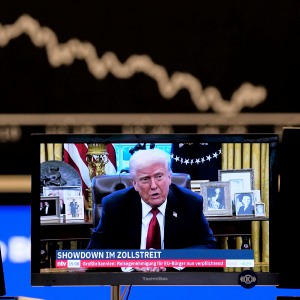Editorial: New Hampshire budget shortfall is a crisis of Republican design

The House of Representatives meets to take up votes on the state’s budget bills, House Bill 1 and 2, on April 10, 2025. (New Hampshire Bulletin - Ethan DeWitt) —
|
Published: 04-11-2025 10:01 PM
Modified: 04-13-2025 1:33 PM |
Who says manufacturing is dead in the United States? The budget crisis that Republican lawmakers in Concord are now purporting to solve through draconian reductions in state spending is at least partially, and perhaps mainly, the result of unwise and unwarranted tax cuts they enacted over the past decade. If that’s not manufacturing a crisis, what is?
The budget that the House passed this week cut $643 million from Gov. Kelly Ayotte’s $16 billion proposal for the two fiscal years beginning July 1, on the grounds that her revenue projections were too optimistic. By the time the Senate gets around to its budget deliberations, the revenue picture might be clearer and the need for cuts of this magnitude to balance the budget less pressing.
But heavily implicated in any budget shortfall are reductions in the state’ two primary business taxes over the past decade and elimination this year of the interest and dividends tax. The New Hampshire Fiscal Policy Institute, a nonpartisan think tank, calculates that cuts in the business profits tax and the business enterprise tax resulted in the state losing somewhere between $795 million and $1.17 billion in revenue from 2016 through 2024. The repeal of the interest and dividends tax forfeits another $185 million in annual revenue.
Contrary to Republican assertions that reductions in business taxes would more than pay for themselves in increased investment and business activity, the Fiscal Policy Institute concluded that no statistically significant relationship existed between the business profits tax rate and job growth or economic activity as measured by gross state product.
Important to note is that, according to the Policy Institute, multi-state and multi-national companies that meet a threshold for sales in New Hampshire are subject to the business taxes, with the result that “a relatively small number of large business-tax filers pay most of the revenue collected.” For 2022, the most recent tax year for which data is available, 5.2% of all business tax filers — 2,554 — accounted for 79.1% of business tax revenue.
Similarly, 90% of the interest and dividends tax for the 2020 tax year was paid by the top 20% of earners and 58% by the top 1%, not by seniors scraping by on fixed incomes as Republicans would have you believe. Phil Sletten, research director for the Fiscal Policy Institute, provided testimony to the House Ways and Means Committee in January 2024 indicating that about 92% of the interest and dividend dollars that would have gone into the state’s general fund “stay with households in the top 20%” of income distribution.
The pattern here is unmistakable: Tax breaks are lavished on businesses and individuals who need them least, a Republican specialty at both the state and national levels.
This is the context in which the budget-hacking justification of Rep. Kenneth Weyler, R-Kingston, chairman of the House Finance Committee, that “the revenue just isn’t there,” has to be evaluated. The budget the House approved would, among other things, cut 150 state jobs, including many in the Department of Corrections; slash mental health and developmental disability services, rolling back several years of progress; reduce funding for the university system by $50 million from Ayotte’s proposal; charge health insurance premiums to parents of children enrolled in the Medicaid program; and reduce reimbursements to Medicaid providers by 3% after a much-needed boost just a year ago. It also envisions increasing fees for a host of services, including the burial fee for the state’s veterans cemetery from $450 to $550, and suspending for a year local communities’ share of the rooms and meals tax, a $30 million shortfall that would have to be covered by local property taxes.
Article continues after...
Yesterday's Most Read Articles
 As spring skiing season winds down, one NH ski area plans to spin its lift until May
As spring skiing season winds down, one NH ski area plans to spin its lift until May
 Newbury,Vt., man who killed daughter ruled to be ‘not guilty by reason of insanity’
Newbury,Vt., man who killed daughter ruled to be ‘not guilty by reason of insanity’
 Kenyon: The true cost of lawsuit for Dartmouth Health
Kenyon: The true cost of lawsuit for Dartmouth Health
 Editorial: Free speech detentions reach into Upper Valley
Editorial: Free speech detentions reach into Upper Valley
 Protesters rally in Lebanon and elsewhere across the country
Protesters rally in Lebanon and elsewhere across the country
 ECFiber and operating company trade legal blows as contract renewal talks break down
ECFiber and operating company trade legal blows as contract renewal talks break down
At the same time, it proposes to expand the so-called Education Freedom Accounts to allow even the state’s wealthiest residents to draw down public school dollars to send their children to private schools, mostly religious ones.
It can be assumed that some of these outrages will be reversed as the budget process unfolds. But it is naive to think that the Republicans in the Legislature did not see this coming even as they recklessly cut tax rates over the years. More likely is that they counted on starving the beast as a means to cut services that they deem unnecessary for ordinary people. It is truly remarked that New Hampshire is a great place to live if you are rich. If you’re not, not so much.






 Editorial: Time is running out for American democracy
Editorial: Time is running out for American democracy Editorial: Jeanne Shaheen blazed a trail in politics
Editorial: Jeanne Shaheen blazed a trail in politics Column: Federal funding for medical research puts America first
Column: Federal funding for medical research puts America first
